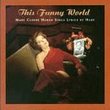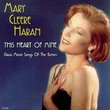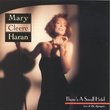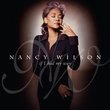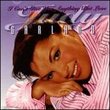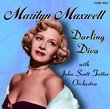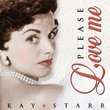| All Artists: Mary Cleere Haran Title: Crazy Rhythm: Manhattan in the 20's Members Wishing: 0 Total Copies: 0 Label: Varese Sarabande Release Date: 9/24/2002 Genres: Pop, Broadway & Vocalists Styles: Vocal Pop, Traditional Vocal Pop Number of Discs: 1 SwapaCD Credits: 1 UPC: 030206216028 |
Search - Mary Cleere Haran :: Crazy Rhythm: Manhattan in the 20's
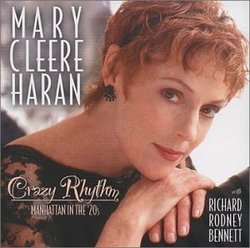 | Mary Cleere Haran Crazy Rhythm: Manhattan in the 20's Genres: Pop, Broadway & Vocalists
|
Larger Image |
CD DetailsSimilar CDsSimilarly Requested CDs
|
CD ReviewsFresh, new sounds for those "tinny" songs from the twenties. Mary Whipple | New England | 11/19/2004 (5 out of 5 stars) "Song stylist Mary Clere Haran, with pianist/singer Richard Rodney Bennett, resurrects old songs from the 1920s, which often sound "tinny" or dated, and gives them new life in this unique and exciting album. Changing the tempo, creating new phrasings, breathing emotion into lyrics one has stopped hearing because of their familiarity, and also having fun with novelty songs that helped make the twenties "roar," she entertains and draws new attention to composers we all regard as "greats" but to whom we may never have listened so carefully. A genius at creating an interesting pace for the CD, Haran alternates fast and slow tunes, changes moods from humorous to passionate, and switches from a light "Betty Boop" voice in songs like "They're Blaming the Charleston" and "Monkey Doodle Doo" to a voice of regret and contemplation in "It Had to Be You" and "Moanin' Low." In a torchy jazz tune with a frantic tempo, "Pack Up Your Sins and Go to the Devil in Hades," by Irving Berlin, she tells us that "Hades is the best of the winter resorts," and that "All the best people are there," camping it up with a "growly" voice that cannot help but bring a smile. But when she does "What'll I Do," also by Berlin, she slows the tempo and whispers, wrapping this familiar song with pathos. The flexibility of her voice and versatility of her styles are showcased by the clever piano accompaniments of Richard Rodney Bennett, who not only accompanies her but also sings on several tracks. The only other instrument we hear is Linc Milliman's bass. Featuring six songs by Irving Berlin, the strongest songs on the album, I believe, she also reinterprets Rogers and Hart, George and Ira Gershwin, Noel Coward, and, in "Lullaby of Broadway," Al Dubin, slowing the tempo until "Lullaby of Broadway" almost sounds like a real lullaby. Reining in her powerful voice, Haran focuses on the lyrics of the songs, singing with her usual clarity but whispering when it suits the lyrics and camping it up on the novelty songs. Haran is at her talented and wide-ranging best here, giving songs from the twenties her all and making them sound fresh and modern. Mary Whipple " Music from a bygone age - still entertaining Peter Durward Harris | Leicester England | 08/16/2003 (5 out of 5 stars) "These songs were being performed in and around New York (and other places) in the very different environment of the 1920's. Yet, Mary proves that these songs still provide great entertainment eighty years later.There are many obscure songs here, though perhaps they were better known when they were new. A few of these songs are still well known, particularly Manhattan, Lullaby of Broadway and It had to be you. Six of the other songs here were composed by Irving Berlin, of which I suppose the best known are probably What'll I do and They're blaming the Charleston - but of course, Irving composed many songs that are far better known than these.The only musicians credited are a pianist (who also provides male vocals on some tracks) and a bass player, yet they provide all the backing Mary needs. I was surprised when I checked the credits to find only two instruments, but that just shows how effectively they are used. I assume that this the way Mary performs these songs live.The songs cover the range from soft ballads to up-tempo romps, all performed superbly by Mary and her two musicians. If you are interested in the music of the 1920's but recorded with modern technology, you'll have difficulty finding a better singer than Mary."
|

 Track Listings (16) - Disc #1
Track Listings (16) - Disc #1